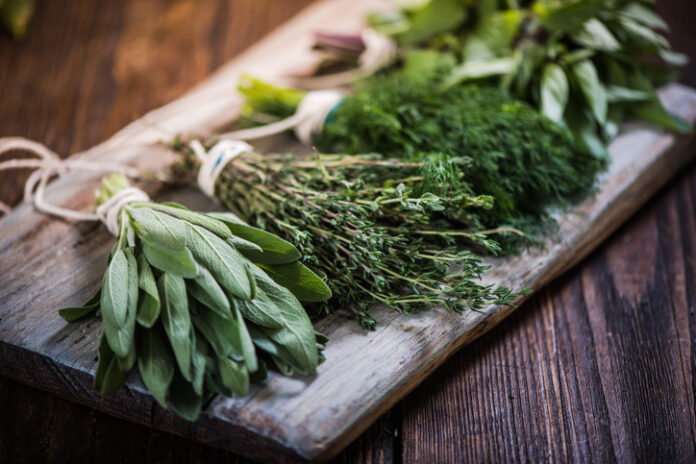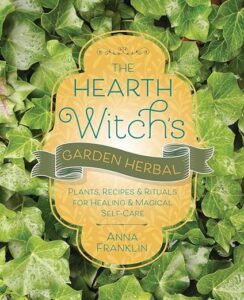Winter and early spring always bring a seasonal crop of coughs, colds, and flu. Happily, Mother Nature provides us with some help to boost our immune systems and treat the symptoms of these ailments.
The most important thing is to eat well to boost your immune system, with plenty of fruits and vegetables. However, there are some herbs will also help. Rosemary is a perfect winter herb, antiviral and full of the vitamins and minerals we need at this time. I add it to soups and stews to get the benefits. Parsley helps lift winter fatigue and supplies plenty of vitamins C, A, and E, plus magnesium, iron, potassium, and calcium. Add it to food or make a cup of tea with a teaspoon of fresh leaves and a cup of boiling water. I always consume plenty of garlic in food in winter; it is both antiviral and antibacterial, and it has been shown to help reduce the incidence and duration of colds thanks to a compound called allin (this is converted in the body to sulphur, which increases the ability of white blood cells to fight infection). Thyme supports the immune system and strengthens the lungs. I like to infuse thyme leaves in honey to make an electuary and take a teaspoon of this whenever I need it or infuse a sprig of thyme in boiling water and drink a cup every morning.
Most people are aware of the benefits of lemon when treating a cold. It is high in vitamin C, which supports the immune system, and has antiseptic, astringent, and fever-reducing properties. It is also soothing the airways thanks to its anti-inflammatory compounds. Try making a tea with lemon juice, and if your diet allows, a teaspoon of honey.
One of the best-known immune boosters is echinacea (Echinacea purpurea or Echinacea angustifolia), usually taken in the form of a supplement. It contains several compounds that stimulate the activity of white blood cells to combat infections, particularly those that affect the sinuses, throat, and upper respiratory tract. My favourite immune booster, though, is elderberry (Sambucus niger), which I take in the form of elderberry vinegar or elderberry glycerite (macerate the berries in vinegar or glycerine for a week). Research has shown that strongly antiviral elderberry can reduce the duration and help relieve the symptoms of flu, colds, and upper respiratory tract infections. Elderberries are rich in vitamin C and antioxidants, which are also beneficial.
It is important to act quickly when an infection strikes. When the first signs of sore throat appear, I gargle with sage (Salvia officinalis) tea, made with two or three leaves and a cup of boiling water. Lemon juice diluted in lukewarm water is effective as a gargle for sore throats; the astringent juice helps shrink swollen tissue and the acidity creates a hostile environment for viruses and bacteria.
To relieve the miserable congestion of a cold and alleviate phlegm, you can try decongestant black pepper, chilli, mustard, or horseradish added to food, or you could employ the drying effect of cinnamon to clear mucus from the sinuses and lungs (you can just chew on a cinnamon stick or take a cup of cinnamon tea). A steam inhalation of eucalyptus essential oil, or a few leaves of fresh marjoram or peppermint in a bowl of boiling water will clear your sinuses. The vitamin C in lemons helps reduce the levels of histamine, responsible for stuffed noses and runny eyes.
If your infection is accompanied by a fever, turn to diaphoretic herbs, which help promote sweating and help break the fever. A tea of ginger, sage, peppermint, yarrow (Achillea millefolium) or elder flowers (Sambucus niger) can all be beneficial.
For a cough, an old country remedy in Britain is horehound (Marrubium vulgare) tea. It helps loosen a cough and also has a soothing effect. Black pepper is an expectorant, which means it helps break up congestion in the chest and sinuses. Have some thyme growing in a pot in your kitchen? It is useful for coughs, colds, flu, and bronchitis, as it is both an expectorant and antispasmodic, which means it helps loosen mucus so you can cough it up while also relaxing constriction in the lungs. Add a spoon of soothing honey to thyme tea. Caraway (Carum carvi) contains mild antihistamines that help to relax the muscles that cause coughing spasms. Use in the form of a tea made from the crushed seeds to soothe the throat, nose, and other parts of the respiratory system. An herb specific for coughs is elecampane (Inula helenium); it supports the lungs and helps expel phlegm.
I hope that you do not suffer too many coughs and colds this winter, but remember that we always have plant allies that can help!
Here’s look at Anna’s latest release:
More than just a place to connect with nature, your garden can provide a variety of foods, medicines, and magical ingredients. This book shows you how to use dozens of common plants to improve your health, make personal care products, and develop your spiritual practice. Some of the flowers you already grow might be as magical as any exotic herb money can buy.
Anna Franklin provides comprehensive profiles for nearly thirty plants, sharing each one’s culinary, medicinal, and cosmetic uses as well as recipes, correspondences, and magical virtues. This practical guide also offers deep insights on seasonal garden rituals, fairy flowers and trees, weather lore, garden spirits and familiars, harvesting and storing, and more. From tinctures, meads, and jellies to creams, bath salts, and incenses, this book helps you turn your bountiful harvest into an enchanting natural lifestyle.
ABOUT THE AUTHOR:
Anna Franklin is a third-degree witch and high priestess of the Hearth of Arianrhod who has been a practicing Pagan for more than forty years. She is the author of nearly thirty books, including the Hearth Witch series, and the creator of the Sacred Circle Tarot, Fairy Ring Oracle, and the Pagan Ways Tarot. Her books have been translated into nine languages. Anna has contributed hundreds of articles to Pagan magazines and has appeared on radio and TV. She lives and works in a village in the English Midlands where she grows her own herbs, fruit, and vegetables, and generally lives the Pagan life. Visit her at AnnaFranklin.co.uk.
COPYRIGHT (2024) Llewellyn Worldwide, Ltd. All rights reserved.




 The Hearth Witch’s Garden Herbal: Plants, Recipes & Rituals for Healing & Magical Self-Care
The Hearth Witch’s Garden Herbal: Plants, Recipes & Rituals for Healing & Magical Self-Care 

